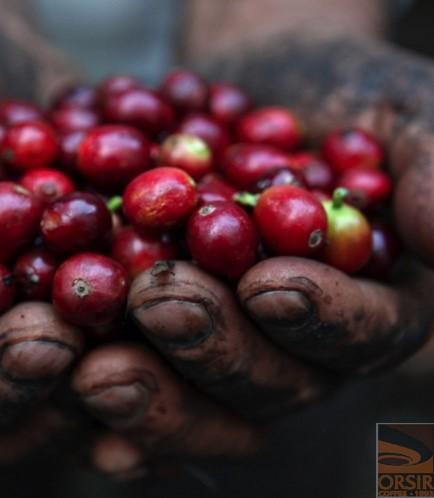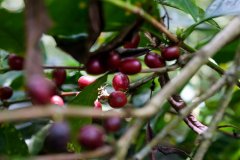2017 current situation of Kenyan Coffee description of Kenyan Coffee Flavor by Gakundu FCS

For professional baristas, please follow the coffee workshop (Wechat official account cafe_style)
In Kenya in 2017, production continued to decline, raw bean prices soared, and there were almost no winners in 2017!
During the main production season at the beginning of the year, the team settled in Kenya for about a week, continued to test more than 100 batches of samples, and finally selected 12 batches to be introduced into China. Let's take a look.
Gakundu, this batch of carefully selected round beans.
The Gakundu Cooperative was founded in the early 1960s and today, it has four processing plants, including Gakundu,Gakui,Kamviu,Gichugu. The members of the cooperative are from the N'Dori area of Embu County, about 150km north of the capital Nairobi. The cooperative is made up of small farmers, who own an average of 250 coffee trees, most of which are SL28, and a small number of Ruiru 11 are used to increase yield and be used as a substitute for diseases.
After the pulp is removed, the coffee cherries will be fermented overnight to decompose the sugars in the sticky layer, then wash them, soak for about 36 hours, and then distribute the coffee evenly on the drying table. The time on the drying table depends on the climate, ambient temperature and processing capacity, and may take a total of 7 to 15 days.
The Gakundu processing plant is receiving assistance from the Coffee Management Service Project (CMS). The long-term goal of the project is to increase coffee production through education and training for farmers, "agricultural loans", "seminars on good agricultural practices" and the "Manual on Sustainable Agriculture", which is continuously updated and distributed every year. For example, some farmers have suggested that fertilizers should be provided by co-operatives to expand fruit production. It is hard to believe that it takes an average of five months for Kenyan coffee farmers to get cash after handing in cherry fruits. Therefore, the financial and cash flow capacity of the cooperative determines the centripetal force and the ability to improve the quality of its coffee farmers. [if you want to have good quality, first solve the lengthy payment mechanism], the introduction of CMS is a great leap forward!
The Gakundu Cooperative has been certified by 4C and Cafe Practices. That is, we pay better prices to producers and get cash earlier, so that both coffee farmers and direct buyers can achieve their goals. Firmly believe that the establishment of a transparent and trusting relationship with coffee farmers will help to support the sustainable development of the coffee industry, which is very important to improve the production standards of quality coffee in Kenya.
Basic information of this batch:
Production unit: Gakundu Cooperative Gakundu FCS
Producing area: Nieri Embu County, Kenya
Altitude: 1720 m
Number of cooperative members: 3654
Cup test flavor (light baking, M0 +): raspberry, black cherry, honey, red currant, chocolate
Important Notice :
前街咖啡 FrontStreet Coffee has moved to new addredd:
FrontStreet Coffee Address: 315,Donghua East Road,GuangZhou
Tel:020 38364473
- Prev

Kenya Coffee roasting record KENYA THIRIKU Kenya AA Coffee characteristics
Exchange of professional baristas follow the coffee workshop (Wechat official account cafe_style) decided to step into the coffee world, seriously learn to taste the flavor of coffee, the beginning of coffee roasting, when the Godfather Coffee Shop had a sun-cured coffee beans from Kenya, with a strong sour taste that stimulates the taste buds and becomes an unforgettable flavor in the taste buds memory bank. So, finally get this Kenya Th.
- Next

Kenya's best coffee-2016WBrC runner-up match bean Koini washing factory Kenyan coffee beans
For the exchange of professional baristas, please follow the coffee workshop (official Wechat account cafe_style) 2016 World Brewing Competition (World Brewers Cup) runner-up beans! Coffee Collective bar player Mikaela Wallgren won the runner-up with this Kenyan Coini in the 2016 World Cooking Competition by a narrow margin of 0.08 points. 2016 World Brewers
Related
- Detailed explanation of Jadeite planting Land in Panamanian Jadeite Manor introduction to the grading system of Jadeite competitive bidding, Red bid, Green bid and Rose Summer
- Story of Coffee planting in Brenka region of Costa Rica Stonehenge Manor anaerobic heavy honey treatment of flavor mouth
- What's on the barrel of Blue Mountain Coffee beans?
- Can American coffee also pull flowers? How to use hot American style to pull out a good-looking pattern?
- Can you make a cold extract with coffee beans? What is the right proportion for cold-extracted coffee formula?
- Indonesian PWN Gold Mandrine Coffee Origin Features Flavor How to Chong? Mandolin coffee is American.
- A brief introduction to the flavor characteristics of Brazilian yellow bourbon coffee beans
- What is the effect of different water quality on the flavor of cold-extracted coffee? What kind of water is best for brewing coffee?
- Why do you think of Rose Summer whenever you mention Panamanian coffee?
- Introduction to the characteristics of authentic blue mountain coffee bean producing areas? What is the CIB Coffee Authority in Jamaica?

